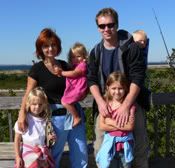
It is captivating to watch "How it's made" on TV. The program is so well presented that I would almost consider it as a field trip. Almost...
There is nothing that comes close enough to being able to see things in action with your own eyes. Let it be a hike in the woods, a music performance or anything else. I guess the more sensors are involved in trying to capture and retain every sound, every odor molecule, every tiny detail, the quicker the information gets absorbed by your brain and faster it becomes more efficient. It doesn't stay long as "entertainment", it gets converted into practical knowledge.
We went to visit a cheese making farm.Check them out here: http://www.canaljunctioncheese.com/
"Canal Junction Cheese Farm" is ten minutes away from "Nothing But Nature". After selling their cheeses at the farmer's market and having tasted a few varieties, I knew the trip would be great! Their cheeses are true gourmet cheeses that one would be very surprised to find in rural Ohio. Or, at least, I was.

The farm has been in cheese making operation for 3 years now. They are still making payments on the loan and will probably will have to pay for the equipment for a few more years. But the business is slowly picking up. Brian, the "Cheese King", was very kind to give us a tour, even though there was no time to spare.
Starting from the spring, he has been making cheese every day. In addition, two times a week he makes cheese for a neighboring creamery.
"It's great, because I get to practice more with what I have been learning. And it is good for me", he said.
He took a cheese making class at Vermont Cheese Institute (http://nutrition.uvm.edu/viac/) and did a few internship programs a few years ago.
"That really gave me a good jump start and helped a lot. But mostly, I have to experiment a lot and see what works best", Brian continued. Yes, once again, it is a constant learning process on any farm.
 Lock 21, Charloe, Alpine, Swiss, Gouda, all were a great hit at the market. Boy, was Brian glad to hear that, even though he knew his cheeses were delicious.
Lock 21, Charloe, Alpine, Swiss, Gouda, all were a great hit at the market. Boy, was Brian glad to hear that, even though he knew his cheeses were delicious."People either love cheeses or not. But if they are cheese fans, everybody tasted a piece and almost all of them bought a chunk or two", I gave him some more good news. "But some people were wondering why your Swiss doesn't have holes!?", I though it would be interesting to find out.
"Oh, I haven't gotten to the aesthetics, yet. I am trying to concentrate on the flavor of the cheeses for now. To have holes in Swiss it gets a bit more complicated and more labor intense. I just don't worry about that for now", Brian explained with an open smile.
And labor intense it is! That day he was manually stirring 3,700 lb. of milk, something close to 450 gallons. This amount of milk usually yields 25 medium wheels of cheese.
 Since coagulating proteins tend to build up in the corners, he had to stir a few times while we were there.
Since coagulating proteins tend to build up in the corners, he had to stir a few times while we were there.Cheese making also requires a lot of energy and a ton of water. Energy is needed for heating up milk, keeping it at a right temperature, for cooling off the storage/aging room, etc. And water is needed to keep everything clean, of course. Whatever attachments Brian used he would rinse them right away. Everything was very clean, and I just loved his white apron and white rubber boots!
Farmer Phil brought a special treat for the cows, aromatherapy. A few drops of concentrated herbal solution will make the milk have a nice meadow aroma. If the cow was standing and smelling manure, the milk would have a manure resembling odor. Not so good for the cheese lovers! And it is not that Brian's cows need the aromatherapy. They are all grass fed and free range. It's just something extra that farmer Phil had thought of.
Brian also showed us the "cheese storage/aging chambers". I have never seen so many cheese wheels in my life! Shelves and shelves filled with delicious cheeses. If it wasn't for 55F temperature there, I would have moved in!
It was a phenomenal experience and it made me appreciate cheese more, especially when it comes from a local farm operation.
And since Diane showed me how she makes her goat cheeses at home using the cultures she buys online (http://www.cheesemaking.com/) ,I guess we'll start from there once we have our homesteading operation going.
Happy cheese making, everybody!

0 comments:
Post a Comment